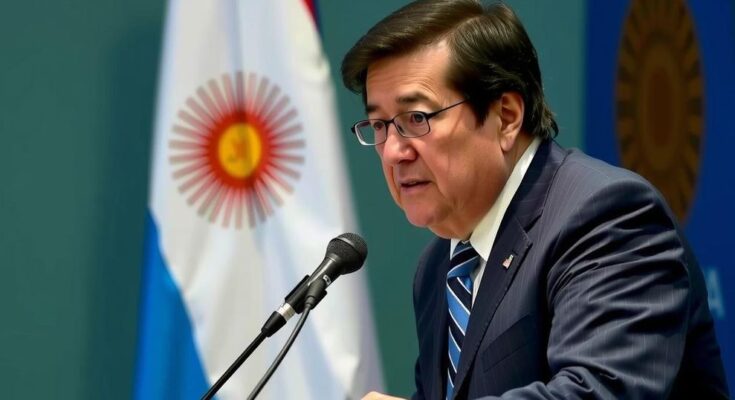Argentina’s President Javier Milei has sacked Foreign Minister Diana Mondino after the nation’s vote at the UN to lift the US embargo on Cuba, joining 186 countries in favor of the resolution. This decision marks a notable departure from Argentina’s customary alignment with US and Israeli policies. Gerardo Werthein has been appointed as the new foreign minister.
On Wednesday, President Javier Milei of Argentina dismissed Foreign Minister Diana Mondino following the country’s vote at the United Nations in favor of lifting the longstanding US embargo on Cuba, a decision that marked a significant divergence from traditional alignments with the United States and Israel. The announcement occurred shortly after Argentina joined 186 other member states in support of the resolution, countering the votes against it by only the US and Israel. In the wake of Mondino’s departure, Gerardo Werthein, previously Argentina’s ambassador to the United States, was appointed as the new foreign minister. Milei’s administration has historically opposed the embargo; however, this instance highlights a politically sensitive shift in Argentina’s diplomatic stance. Sources within the foreign ministry noted that such a stance may complicate future interactions with the US and Israel, particularly in light of Argentina’s sovereignty claims over the Falkland Islands, a matter for which support from Cuba and its allied nations could be critical. Following the announcement of Mondino’s sacking, President Milei retweeted a remark from a lawmaker expressing pride in a government that does not condone authoritarian regimes, underscoring his commitment to a principled foreign policy stance.
The United States has maintained an embargo against Cuba since 1962, intended as a measure to discourage the communist regime on the island. Over the decades, numerous countries have varied in their positions regarding this embargo, with many advocating for its removal, reflecting a broader desire for engagement with Cuba. Historically, Argentina has participated in votes against such embargoes. However, under the recent leadership of President Milei, Argentina’s foreign policy appears to be navigating a more complex geopolitical landscape, particularly with respect to its relationships with traditional allies such as the US and Israel.
In conclusion, President Javier Milei’s decision to dismiss Foreign Minister Diana Mondino following Argentina’s supportive vote at the UN to lift the US embargo on Cuba demonstrates a pivotal moment in the country’s foreign policy. This move not only signifies Argentina’s willingness to diverge from the positions of its allies but also raises questions about the future of its diplomatic relations, especially concerning the sovereignty issues surrounding the Falkland Islands. The appointment of Gerardo Werthein as the new foreign minister indicates potential shifts in policy direction moving forward.
Original Source: www.france24.com




